Guillain-Barré Syndrome
A rare disorder known as Guillain-Barré syndrome (GBS) causes the patient’s immune system to target the peripheral nerves. Although it can affect individuals of all ages, adults and men have a greater probability of being impacted.
Even among those with the most severe forms of Guillain-Barré syndrome, the majority of patients fully recover. Although severe Guillain-Barré syndrome instances are uncommon, they can cause respiratory difficulties and nearly complete paralysis. Guillain-Barré syndrome is related to a possible death chance.
Guillain-Barré syndrome patients should receive treatment and close observation as soon as feasible; some may require critical care. The technique of treatment contains supportive care as well as specific immunological therapies.
What is the Guillain-Barré Syndrome?
- The illness may impact not just the nerves that regulate muscular contraction but also the nerves responsible for transmitting pain, temperature, and touch perceptions. This may result in breathing or swallowing difficulty, numbness in the arms and/or legs, and muscle weakness.
- The illness can impact not only the nerves that regulate muscular activity but also the nerves that convey pain, temperature, and touch sensations. This may result in weakness of the muscles, numbness in the arms and/or legs, and trouble eating or breathing.
- Though it can impact people of all ages, adults and males are more likely to contract this rare condition. However, the majority of patients recover from the illness with treatment.
What is the frequency of Guillain-Barré Syndrome?
It is uncommon to have Guillain-Barré syndrome. Every year, the Guillain-Barré syndrome strikes more than 100,000 individuals everywhere. To put that in point of view, there are roughly 7.8 billion people on the planet. This implies that roughly 1 in 78,000 persons are diagnosed with Guillain-Barré syndrome annually by medical professionals.
What are the Causes of the Guillain-Barré Syndrome?
Guillain-Barré syndrome is a neuropathy resulting from an immune system-produced illness.
- Post-infectious: The term “post-infectious” refers to the state that usually arises following an infection of a certain type. In one to six weeks following their illness, symptoms may begin to appear according to up to 70% of Guillain-Barré syndrome patients. Why some people with Guillain-Barré syndrome get sick and others do not is a mystery to researchers.
- Immune-mediated: An abnormal immune system reaction is the cause of an immunological-mediated illness. Guillain-Barré syndrome develops in certain individuals when their immune system reacts improperly to an illness, attacking and damaging peripheral nerves. This is an alternative name for the autoimmune condition. Guillain-Barré syndrome isn’t chronic, though, like the majority of autoimmune diseases are (lifelong).
- Neuropathy: All illnesses that harm your nerves are collectively referred to as “neuropathy.” The peripheral nervous system is in the presence of Guillain-Barré syndrome. Your immune system attacks your nerves quickly over many days, leading to the loss of myelin, which is your nerves’ “protection.”
Study Analysis shows that numerous infections and additional immune system-related illnesses can result in Guillain-Barré syndrome. These include:
- A respiratory illness or diarrhea: Approximately two out of every three Guillain-Barré syndrome patients experienced either of these conditions weeks before exhibiting symptoms of the disease. One of the most frequent causes of GBS is infection with the diarrhea-causing bacterium Campylobacterjejuni.
- Viral infections: The Epstein-Barr virus, cytomegalovirus, Zika virus, or other viruses have been the source of viral infections in a comparatively limited number of people with Guillain-Barré syndrome.
- Vaccines: Very rarely have persons experienced Guillain-Barré syndrome in the days or weeks following a particular vaccination. It’s critical to understand that vaccinations have considerably more advantages than disadvantages. Research indicates that the risk of contracting Guillain-Barré syndrome is higher if you have the flu than receiving a vaccination against the illness.
- Surgery: Obeying any surgery, Guillain-Barré syndrome is quite uncommon to develop.
What signs and symptoms are present in Guillain-Barré syndrome?
- Your peripheral nerves, which regulate muscular contraction, pain perception, temperature, and touch, are impacted by Guillain-Barré syndrome. As a result, Guillain-Barré syndrome creates problems with these functions.
- Guillain-Barré syndrome initially manifests as paresthesia or tingling or weakening of the muscles. Usually, these symptoms appear suddenly. Usually affecting both sides of the body, they begin in the legs and feet and progress up to the arms and face. It could be challenging for you to walk or climb stairs if you have weak leg muscles.
The severity of Guillain-Barré syndrome can vary from very minor to severe. Depending on how serious the illness is, other signs and symptoms could be:
- Pain in your legs or back muscles that go deep.
- Paralysis of your face muscles, arms, or legs. In extreme circumstances, you can become nearly completely paralyzed.
- Weakening of the muscles surrounding the chest, potentially leading to respiratory problems. One in three persons who have Guillain-Barré syndrome are impacted by this.
- Speech and swallowing difficulties (dysphagia).
- Visual problems and trouble moving your eyes.
The symptoms of GBS may worsen in a matter of days, weeks, or even hours. Most people reach their most severe level of weakness within two weeks of the commencement of symptoms. Ninety percent of people are at their lowest stage by the third week.
What Are the Types of Guillain-Barré Syndrome?
Depending on the type, Guillain-Barre syndrome might have different symptoms. Guillain-Barre syndrome manifests in various ways. The primary kinds are:
- AIPD Acute inflammatory demyelinating polyradiculoneuropathy is the most prevalent kind in North America and Europe. Muscle weakness that originates in the lower body and moves upward is the most typical symptom of AIDP.
- The initial symptom of Miller-Fisher syndrome (MFS) is acute ocular paralysis. In addition, MFS is linked to an unsteady gait. In comparison to the US, MFS is more common in Asia.
- Acute motor axonal neuropathy (AMAN) and acute motor-sensory axonal neuropathy (AMSAN) are relatively uncommon conditions in the United States.
What are the Risk Factors of Guillain-Barré Syndrome?
Guillain-Barre syndrome involves individuals of all ages, even though the risk increases. Also, men are far more likely than women to encounter it.
Anyone can be impacted by Guillain-Barré syndrome. Most people over fifty have it.
It is most frequently linked to a recent respiratory or gastrointestinal infection; other illnesses, surgeries, traumas, or vaccinations are less frequently linked to it. In the days or weeks that follow the onset of neurological system symptoms, diarrhea or coughing are experienced by about two-thirds of those diagnosed with Guillain-Barré.
Among the possible Guillain-Barré syndrome triggers are:
- Undercooked poultry contains a form of bacterium called campylobacter, which is thought to be the most common trigger.
- The influenza virus
- COVID-19 infection
- The cytomegalovirus
- Epstein-Barr virus
- Zika infection
- Hep A, B, C, and E hepatitis
- HIV is the virus responsible for AIDS.
- Mycoplasma-related pneumonia
- Operation
- Trauma
- Hodgkin’s lymphoma
- Johnson & Johnson and AstraZeneca COVID-19 vaccinations
Although exposure to these triggers increases the risk of Guillain-Barré syndrome, the reason why certain people, but not all of them, develop GBS following an infection or other medical event remains unclear.
What is the Diagnosis of Guillain-Barré Syndrome?
Guillain-Barré syndrome symptoms can mimic those of other neurological disorders. To rule out other causes, your doctor will probably go through a thorough procedure. That might consist of:
Asking about the beginning, course, and history of any current health issues
Performing a routine physical assessment
- Neurological Examination: A neurological examination, during which they assess your speech, balance, reflexes, strength, coordination, and sensitivity to touch in addition to your mental state
- Spinal tap (lumbar puncture). Additionally, you will probably have a few tests, such as a spinal tap (lumbar puncture).To take a sample of the fluid surrounding your spinal cord, your doctor will stick a needle into your lower back. We’ll test the fluid in a lab. Guillain-Barré syndrome is correlated with raised fluid protein levels.
- Electromyography: Your doctor will introduce extremely fine needle electrodes through the skin and into the afflicted muscle to monitor the amount of nerve activity in that muscle.
- Nerve conduction research. The physician will apply electrodes to the skin above the nerves and give a tiny shock to monitor the speed of nerve transmissions.
- Imaging examinations. An MRI may include an investigation of your spine or brain.
What is the Treatment for Guillain-Barré Syndrome?
If Guillain-Barré syndrome is detected, you should start therapy as soon as you can. It is anticipated that you will be admitted to the intensive care unit.
The following therapies can fasten your recuperation or lessen the severity of your illness:
- Plasmapheresis, or Plasma exchange. Your body receives replacement fluids and blood cells back from a machine that separates your plasma, or liquid portion of blood, from your blood cells. It encourages your body to produce fresh plasma. Your plasma may be filtered to remove antibodies that are damaging your nerves.
- Immunoglobulin treatment. Via an IV, you will receive large doses of healthy antibodies from another person. These decrease the physical attack on your body by your immune system.
You may require more therapies, such as:
- Painkillers.
- Medications to stop blood clots, which might occur from a sedentary lifestyle.
- IV fluids if you have trouble swallowing so you don’t become dehydrated.
- You can be fed through a tube if you are unable to eat regularly.
- If, as can happen in up to 30% of cases, you are temporarily unable to breathe on your own, a breathing tube can help.
You might go to a rehabilitation center as you heal, where you could receive:
- Physical therapy is used to relieve pain and stiffness as well as to restore strength and mobility.
- Occupational therapy can help you become more adept at performing regular duties securely.
- Speech treatment to improve speaking and swallowing skills
Physical therapy for the Guillain-Barré Syndrome
For those suffering from Guillain-Barré syndrome, physical therapy is an essential part of their healing process. Because of this sickness, the immune system targets the nerves, resulting in paralysis and weakening of the muscles.
The primary goals of physical therapy for Guillain-Barré Syndrome are given below:
- Prevent the atrophy of muscles.
- Increase range of motion.
- Improve muscle strength
- Getting coordination and balance.
The following are the techniques used in physical therapy for Guillain-Barré Syndrome
- Pain Management: Certain methods, such as heat/cold treatment and massage, can assist reduce discomfort.
- Passive range of motion (PROM): When the patient’s limbs retain flexibility when they are unable to move them independently.
- Active assisted range of motion (AAROM): The patient performs activities with assistance from the therapist.
- Active range of motion (AROM): As strength increases, the patient completes activities on their own.
- Strengthening exercises: A gradual sequence of activities to increase muscle strength.
- Balance and Gait training: Exercises recommended to improve stability and reduce the chance of falling include balance and gait training. A crucial component of gait training is learning to walk both with and without assistance.
- Functional training: Exercises that resemble everyday tasks to increase independence are called functional training.
What is the prognosis of Guillain-Barré syndrome?
The prognosis (outlook) for Guillain-Barré syndrome is different. Guillain-Barré syndrome symptoms usually improve considerably over time and with treatment. Most individuals started to recover two to three weeks after the symptoms first occurred. The rehabilitation process could take several months to a year or longer, following how severe it is. However, three years after diagnosis, roughly 30% of adults and even more youngsters still have some degree of muscle weakness.
What are the Complications of Guillain-Barré Syndrome?
Nerves are affected by Guillain-Barre syndrome. People who have Guillain-Barre syndrome may experience the following because nerves control their movements and bodily functions:
- Trouble breathing. Your breathing muscles may weaken or become paralyzed. This might be deadly. Within the first week of being admitted to the hospital for treatment, up to 22% of patients with Guillain-Barre syndrome require temporary breathing assistance from a machine.
- Persistent numbness or other sensations. Individuals with Guillain-Barre syndrome usually recover completely or have minimal residual tingling, numbness, or paralysis.
- Blood pressure and heart issues. Guillain-Barre syndrome frequently causes abnormal heart rhythms and blood pressure fluctuations.
- Pain. Nerve discomfort is undergone by one-third of those with Guillain-Barre syndrome, and it can be controlled with medicine.
- Problems with the bladder and bowels. Reduced bowel motions and urine retention are two factors linked to Guillain-Barre syndrome.
- Blood Clots. Blood clots can form in people with Guillain-Barre syndrome who remain sedentary. You might need to take blood thinners and wear support stockings to improve blood flow until you can walk on your own.
- Pressure sores. If you’re unable to move, you may be at risk of getting bedsores, also called pressure sores. Frequently shifting positions could assist in preventing this issue.
- Recurrence. Relapses are rare in patients with Guillain-Barre syndrome. Even years after symptoms have subsided, a relapse can result in muscle weakness.
There is a higher chance of long-term complications when the early symptoms worsen. In rare cases, complications like heart attacks and respiratory distress syndrome can result in death.
What are the Prevention for the Guillain-Barré Syndrome?
Guillain-Barré syndrome cannot usually be prevented. The reason why some patients get Guillain-Barré syndrome after being ill and others don’t is unknown to researchers. The best way to lower your risk of Guillain-Barré syndrome is to strive to preserve your health as much as you can. The following actions can be beneficial:
- Frequently wash your hands.
- Remain away from people who are infected or who have the stomach flu.
- Consume a healthy diet and do regular exercise to strengthen your immune system.
- Common surfaces like phones, doorknobs, toys, tables, and countertops should all be cleaned and sanitized.
- Keep up with all of your vaccinations.
Summary
Guillain-Barré syndrome is a dangerous illness that has the potential to dramatically change your health. Guillain-Barré syndrome may be noticeable if you have tingling, weakness, or numbness in your feet or legs that starts to travel up your body. or if you experience issues with your facial muscles.
The majority of Guillain-Barré syndrome patients respond well to therapy, which is a great thing. However, it can take some time. As well as the recovery process can also be tiring and frustrating. Recognize that your medical team will support you along the entire journey. Never forget to ask your loved ones for support when you require it. Seeking medical attention as soon as possible can facilitate a quicker, less complicated recovery. You’ll typically make a full recovery.
FAQs
What are the Guillain-Barré syndrome’s three stages?
The syndrome known as Guillain-Barré comprises two stages. The first set of symptoms has been directed towards the acute phase. Next comes a plateau. When the symptoms begin to go away, the recovery period starts.
How much time does Guillain-Barré syndrome last?
Guillain-Barré syndrome usually results in a full recovery, though this might occasionally take a long period, and about 1 in 5 patients have long-term issues. Most people get better in less than a year. While it is uncommon, some people may experience symptoms years later
How does Guillain-Barré syndrome get diagnosed?
Your doctors will review your medical history, ask you about any symptoms you may be having, and do a physical and neurological examination if they think you could have Guillain-Barré syndrome. After that, they could ask for more testing, such as a spinal tap, to confirm the diagnosis of Guillain-Barré syndrome.
How is Guillain-Barré syndrome treated?
Intravenous immunoglobulin is a significant and often-used treatment for Guillain-Barré syndrome (IVIG). When you have Guillain-Barré syndrome, your immune system, which is the body’s natural defensive mechanism, produces harmful antibodies that attack the nerves. The effectiveness of IVIG therapy is reliant on the presence of healthy antibodies in donor blood.
References:
- Guillain Barre syndrome -Symptoms and causes -Mayo Clinic. (2024, June 7). Mayo Clinic. https://www.mayoclinic.org/diseases-conditions/guillain-barre-syndrome/symptoms-causes/syc-20362793
- Professional, C. C. M. (n.d.). Guillain-Barré Syndrome. Cleveland Clinic. https://my.clevelandclinic.org/health/diseases/15838-guillain-barre-syndrome
- Guillain–Barré syndrome. (2023, August 15). https://www.who.int/news-room/fact-sheets/detail/guillain-barr%C3%A9-syndrome
- Guillain-Barré Syndrome. (2024, March 25). Johns Hopkins Medicine. https://www.hopkinsmedicine.org/health/conditions-and-diseases/guillainbarr-syndrome
- Painter, K. (2024, March 14). What Is Guillain-Barré Syndrome? WebMD. https://www.webmd.com/brain/what-is-guillain-barre
- Website, N. (2024, January 29). Guillain-Barré syndrome. nhs. uk. https://www.nhs.uk/conditions/guillain-barre-syndrome/
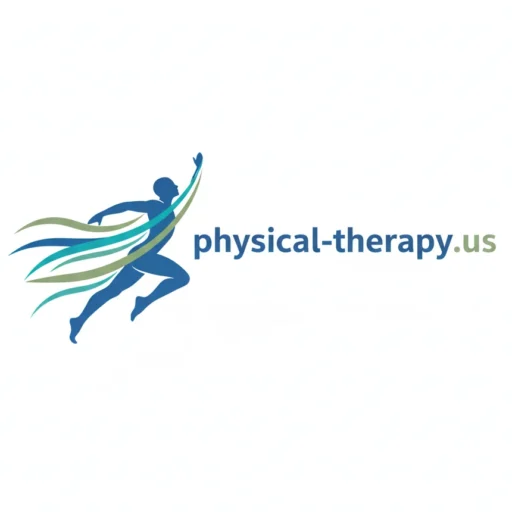
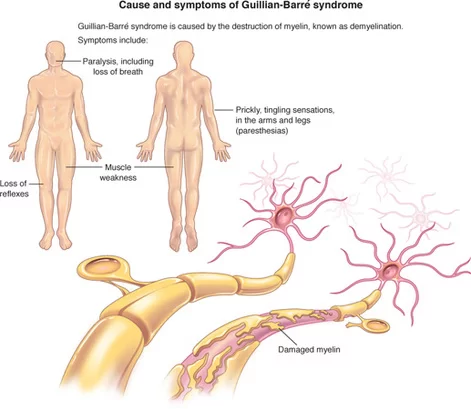


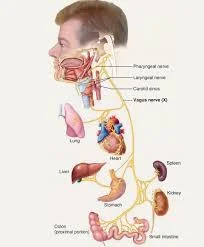
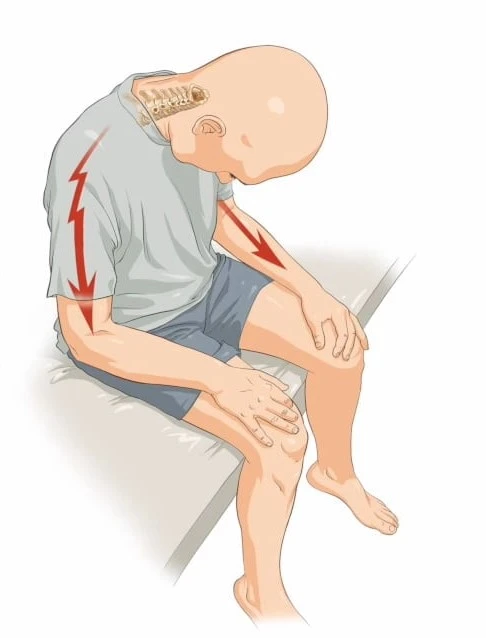
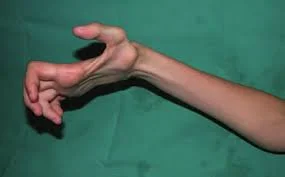
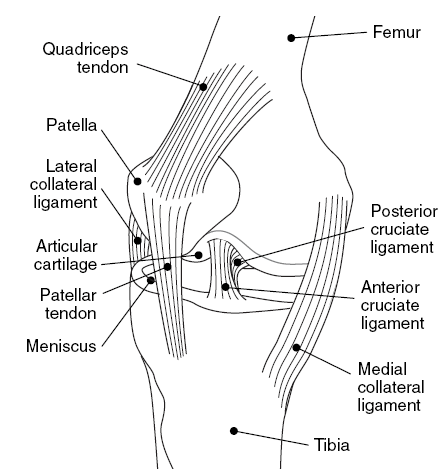
One Comment